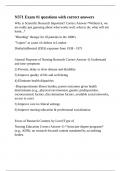N371 Exam #1 questions with correct answers
Why is Scientific Research Important? Correct Answer-*Without it, we
are really just guessing about what works well, what to do, what will not
harm...*
"Bleeding" therapy for ill patients in the 1800's
"Vapors" as cause of cholera in London
Diethylstilbestrol (DES) exposure from 1938 - 1971
General Purposes of Nursing Research Correct Answer-1) Understand
and ease symptoms
2) Prevent, delay or slow disease and disability
3) Improve quality of life and well-being
4) Eliminate health disparities
-Disproportionate illness burden, poorer outcomes given health
determinants (e.g., physical environment, genetic predisposition,
socioeconomic factors, discrimination factors, available social networks,
access to care)
5) Improve care in clinical settings
6) Improve nursing education & professional socialization
Focus of Research Content, by Level/Type of
Nursing Education Correct Answer-1) *Associate degree programs*
(e.g., ADN): no research-focused content mandated by accrediting
bodies.
,2) *Baccalaureate programs* (e.g., BSN): basic understanding of
research process, identify problems, collaborate on research teams, apply
findings in practice and research
3) *Masters programs* (e.g., MSN): prepare nurses to evaluate research
findings, develop and implement evidence-based practices, identify
problems, collaborate with scientists to initiate research
4) *Practice-focused doctorate programs* (e.g., DNP): prepare nurses to
translate research into practice and collaborate with scientists to evolve
translation and evaluation into health policies.
5) *Research-focused doctorate programs* (e.g., PhD): prepare nurses to
conduct independent knowledge-generating research, and to involve
other nurses in that work
6) *Post-doctoral programs* (e.g., T32 Post-doctoral Fellow): provide
PhD-prepared nurses with 2 years of additional time to develop their
research skills and their science under mentorship of experienced
scientists.
Clinical Questions Correct Answer-*Arise in practice, clinical
experiences, patient encounters*
Theoretical & Patient-Situation Specific
1) PICO/PICOT = *"Background"* -->Theoretical
-Why is aseptic technique important when caring for open wounds?
2) PICO/PICOT - *"Foreground"* --> Patient-Situation Specific
-In diabetic patients with venous stasis ulcers on their lower extremities,
what is the best topical medication to apply to regenerate tissue?
, Different from *research* questions:
-These ask what is already known about "X", rather than asking a
question that generates new knowledge about "X"
Breakthroughs in Scientific Research: The Discipline of Nursing, 1960-
1999 Correct Answer-1) Focus on "pathfinders"
2) Violent/abusive behavior within relationships not considered a 'health'
issue, but a criminal justice one (up to 1980s).
3) Nursing research contributions to moving Domestic Violence from
overlooked problem to routine clinical practice.
Nursing Research Example: Domestic Violence Correct Answer-1) No
word, or term, for "domestic violence" in the 1980s.
2) Injuries overlooked, not questioned.
3) "Root causes", or etiology, not addressed.
4) Nurses began identifying frequency, risks for, and patterns of injuries
informally in practice settings.
5) Questions about injuries emerged from practice.
Nurse researchers applied scientific methods to define, understand,
assess at individual level.
Nursing Research Example: Pain Management Correct Answer-1) Pain
viewed as unavoidable, inconsequential phenomenon.
2) Nurses witnessed most frequently in patients, without responsive
healthcare system.
3) Breakthroughs in pain management




